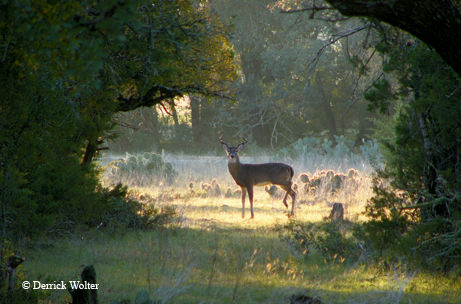
No Place to Run
An agreement between states keeps sportsmen from flouting game laws.
By John Jefferson
Suppose that a young man from Texas was hunting in Colorado. He was a conscientious hunter and a good citizen in most respects. He never intentionally broke the law, he paid his bills on time, and he treated his dogs well.
Laws in other states can be a little confusing, however, and this young man misunderstood a requirement in the state regulations where he was hunting. He didn’t know he had done anything wrong until a game warden appeared and wrote him a citation. Then the warden took him to town to see the judge.
A hunter or angler in his home state would receive only the citation, which he could contest or pay. In the past, some nonresident hunters across America ignored the citations they received, perhaps assuming they would not be extradited over a minor game violation. Therefore, taking them immediately before a judge was the only recourse. If the person was found guilty, the judge could assess a fine and expect payment. If the fine couldn’t be paid, jail time was an option — not to mention a heck of an inconvenience.
Having to pursue justice in this way affected enforcement. Wardens had to drive into town to take the violator to court, arrange for a meeting with the judge and then drive back later. According to state Game Warden Jim Lindeman, that process could take anywhere from 30 minutes to four hours, depending on where the violation occurred. In larger counties, it could take considerably longer. If the judge was busy, the warden might have to wait, leaving game and fish resources unprotected, perhaps during a busy season.
Luckily, a better method of handling minor violations was on its way. In the early 1980s, authorities in western states began discussing a possible solution patterned after the Driver’s License Compact and Non-Resident Violator Compact. Under those compacts, nonresident speeders could receive a ticket instead of going before a judge, and information regarding the citation would be shared with the violator’s home state. If the violator did not comply with the citation’s terms, the home state could take action such as suspending the person’s driver’s license.
In 1989, Colorado, Nevada and Oregon passed Interstate Wildlife Violator Compact legislation, with those states forming the core of the compact.
In Texas, the Legislature’s Sunset Commission report discussed the advantages of the compact and authorized the Texas Parks and Wildlife Commission to join. The TPW Commission adopted Texas’ entrance into the compact in November 2009, and the compact ratified its membership on May 30, 2010.

The Sunset Commission noted that of the 1.1 million hunters in Texas, 123,000 were nonresidents. That’s 11 percent. There were also 218,000 nonresident fishermen out of an estimated 2.5 million total fishermen, or 8.7 percent, based on 2006 figures, the most current numbers available at that time. The commission reported that enforcing game and fish laws against out-of-state violators was a time-consuming endeavor for wardens, with 1,803 citations issued to nonresidents, or 8.2 percent of all citations issued by Texas wardens. Calls to Operation Game Thief (800-792-GAME) no doubt helped increase investigations.
The commission acknowledged that without a better system, arrests were required because of the difficulty of collecting a judgment after an offender had left the state. The compact provided that better system. It worked both ways — Texans hunting or fishing in other states could also just receive a citation and settle it on or before the appearance date instead of going to straight to court. Under the compact’s terms, an accused violator who did not make an appearance to pay the fine or contest the charge could have his hunting or fishing license suspended. Under the terms of the compact, once a license is suspended in one state, it is suspended in all participating states.
So far, 37 states have joined the compact. Arkansas, Nebraska, both Carolinas, Virginia and Maine are in the process of joining. Only the New England states haven’t.
Out of 302,000 Texans who hunt or fish out of state, seven have had their licenses suspended for “failure to appear” in other compact states, according to Scott Vaca, TPWD assistant chief of wildlife enforcement, who supervises the compact in Texas. One had his license suspended because of nine violations for false information on license applications as well as hunting a mountain lion without a nonresident license. His hunting, fishing and trapping privileges are suspended until 2016 in all compact states.
Under the compact, if a Texas hunter has his license suspended in another state for a violation that is not against the law in Texas — like hunting deer over bait — Texas may still suspend the license.
The compact benefits sportsmen who honor their responsibilities. It has teeth for those who don’t.

